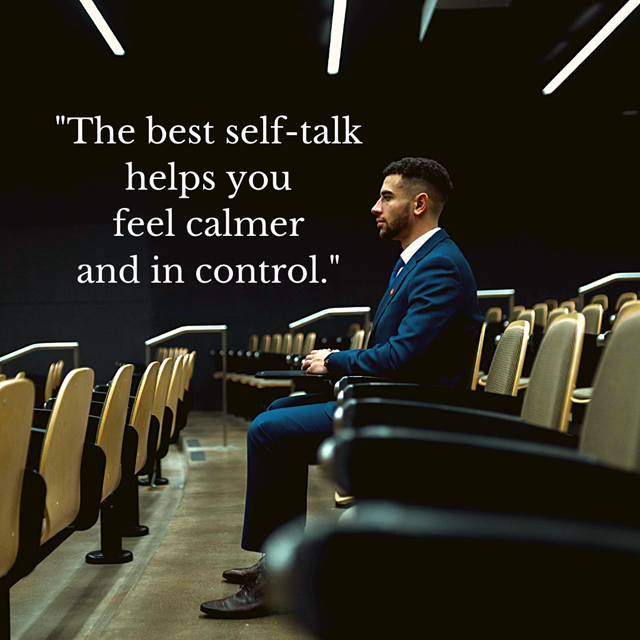
We're seen it work almost like magic:
- Speakers stop telling themselves how nervous they are or how bad they'll be.
- They change their self-talk to something positive AND...
- They're able to reduce nerves and feel more confident.
Like so many simple recipes (we think of buttermilk biscuits, for example), it's not necessarily a snap to pull off.
At The Buckley School, for ourselves and others, we find we need more than a "yay, you" or "you've got this." We've seen that nervous speakers are more apt to listen to self-talk when we tell ourselves something that's concrete and true.
"The best self-talk helps you feel calmer and in control. It combines self-compassion and appropriate responsibility-taking."
– Psychologist Alice Boyes
Here are some true, positive things you can tell yourself when you need to wrangle your nerves:
"I have information that can help."
That's usually the reason people get up to speak. If you're presenting, you are bound to have some ideas that can be useful, something to teach, or a few facts that can enlighten.
Put the message ahead of yourself. You're not stepping up to be an entertainer or impress them with your brilliance--though when you embrace this line of self-talk, chances are greatly improved that you'll do both.
Your primary reason for speaking is to help. So have a serious little chat with your ego about that.
"The audience wants me to succeed."
No, this isn't drawn from the Stuart Smalley brand of self-help. It's inspired by our belief that audiences are as self-interested as the rest of us. They want you to do well, because it's painful to watch a speaker who's trembling, uncomfortable, or struggling.
Audiences will be rooting for you (at least, most of them will be), because your success up there benefits them. Don't hesitate to tell yourself that.
"I can be nervous and still do a great job."
Lack of nerves does not indicate that you've "arrived" as a presenter. Many talented, high profile speakers will tell you they get nervous every time they take the stage.
Over the last year, we've had many veteran speakers tell us that presenting on a virtual platform makes them more nervous than speaking in-person.
So dial the nerves down by reassuring yourself--it's okay to be nervous. In fact, it's a sign that you care.
Experience has taught us:
- Few in the audience will notice, no matter how nervous you feel.
- Nerves tend to calm as we continue speaking, so remind yourself that you'll keep going and it will get better.
- You can always acknowledge your nerves if they get the best of you, and no one will die. (We don't recommend copping to being a nervous wreck on a regular basis--see first bullet--but occasionally, this CAN help you get past a debilitating case and it can be soothing to keep that in mind.)
"I’m excited to get this chance."
You've probably heard about this line of self-talk that comes from the "anxiety reappraisal" department. Harvard professor Alison Wood Brooks determined that it is easier to go from anxious to excited than it is to go from anxious to calm.
In one test, she instructed participants to say either I am anxious, I am excited, or nothing at all. Then each participant gave a two-minute speech. Those who told themselves they were excited spoke longer, more easily, and came across as more confident and persuasive.
Learn more
For more on anxiety reappraisal, see this article.
While the science behind it has come under question, you may find the starfish pose can help boost your confidence pre-speech.
This story has more about the link between mindset and controlling public speaking nerves.






